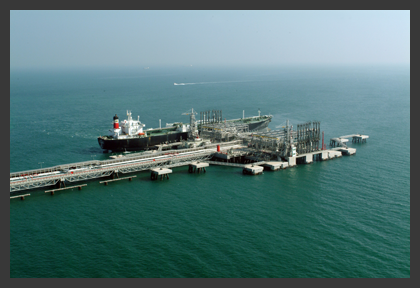Kuwait Liquified Natural Gas and Nuclear Ambition
The peaceful use of nuclear energy in particular celebrates a comeback in the Middle East. The UAE and Saudi Arabia will definitely build nuclear plants in order to stand on the same level as Iran, which is on the threshold of becoming a nuclear power.
Still room for new ports
LNG stands for liquefied natural gas. When gas is found underneath the earth in deep sea water, it will be cooled so that its volume will shrink by 60 times. Only in the liquid form is it ready to be transported by tankers and by pipelines in an economic way. Kuwait celebrated the opening of Mina Al Ahmadi LNG terminal in late summer 2009 when the 147,000m³ Grand Aniva tanker from the Sakhalin II project docked at the port. 
The Mina Al-Ahmadi terminal is operated jointly by Kuwait National Petroleum Company (KNPC) and Excelerate Energy from the US. The port proves that the northern sheikhdom has not yet reached its limit when it comes to innovation.
Innovation is good, but not everything is known from day one. According to KOC ’s Sami Al-Rushaid, the world’s demand for energy can only be met with an energy mix, rather than a shift from carbon to pure green resources.
“If we are talking about Kuwait economic development then there is a definite need for energy from all sources in order to cope with the growth. I believe fuel, oil, gas, nuclear, renewables, and coal will all be needed, although oil will always be a major player in the energy scene. We also need to be environmentally responsive and to attend to environments needs, whether it is clean up or other environmental measures.”
The peaceful use of nuclear energy in particular celebrates a comeback in the Middle East. The UAE and Saudi Arabia will definitely build nuclear plants in order to stand on the same level as Iran, which is on the threshold of becoming a nuclear power. In March 2009, Kuwait’s cabinet approved a draft project to set up a national nuclear energy commission and subsequently informed the International Atomic Energy Agency (IAEA) in Vienna about its intention to “join the club.”
GCC states are eager to diversify their energy sources in order to keep their oil and gas reserves for the export business by providing households with other forms of electricity sources.